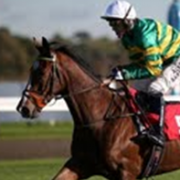The smart money at the Melbourne Cup is nowhere near the horses
How do you make a small fortune in horse racing? Start with a large fortune.
It's an old joke, but when it comes to the Melbourne Cup, it's one that rings particularly true.
When you take into account how much it costs to get a horse in the Melbourne Cup, it really is no wonder they call it the “sport of kings”.
Let's have a look at what it costs to put a runner in the race that stops a nation. These numbers, as you'll pick up pretty fast, are rough estimates and we're more or less counting on our fingers for a bit of fun.
Let's say you already own the horse. Maybe you bought the three-quarter brother to Makybe Diva in 2005 for $2.5 million and he turned out to be a champ. The initial payment is done, so now you just have the annual cost.
The average cost of owning a racehorse in Australia is $35,000 per year -- this is the trainer's fee and includes training, care, welfare and local transportation.
But according to Mark Kavanagh, who trained the 2009 Melbourne Cup winner Shocking, it costs more like $45,000 to train a horse capable of running in the big race.
“People have no idea how much it actually costs to get [to the Melbourne Cup],” he says. “It's a lot harder than it looks.”
His tip for the winner is Signoff, by the way, who this morning was paying $7 for the win.
As an aside, for many trainers the fees are just covering costs and the way they make money is their small cut of the winnings.
Then you've got the entry fees, and they're hefty. To make the final field, which is can be up to 30 horses, costs $1,650, then first declaration is $2,640, second declaration is $4,620. Then you have to cough up a whopping $49,500 as the final field fee.
That means every horse running in today's cup has had someone (or a syndicate) paying $58,410 just in fees for the big day.
Now comes transport costs. The international transportation of a champion racehorse to Melbourne can cost anywhere between $50,000 and $100,000 (depending if you want the window seat et cetera), and 22 of this year's 23 horses are international.
But what about that rich purse, you ask? This is where the eyes widen and people let fantasy piledrive their bank balance. Of the total $6 million prize pool, this year's winner will walk away with $3.6 million in cash, along with a set of trophies worth $175,000.
Here's where the rest goes: Second $900,000; third $450,000 and fourth wins $250,000. Fifth through 10th all win $125,000.
That means the owners of the majority of horses today don't win anything. Zero.
Our rough numbers work leaves us with this: Being conservative, it could cost around $158,410 to get an international horse from the start of the year to a Melbourne Cup start. This means your horse would have to finish in the top 10 just to get your money back!
Imagine if it was scratched, like Lloyd William's Sea Moon. Talk about a heart/bank-breaker.
The real winners are clearly the people selling champagne, suits, dresses and silly hats.
In the nine-week Spring Carnival period between September 6 and November 9, Myer sells 300,000 dresses (33,000 per week); 28,600 units of millinery -- in the busiest week they sell more than one fascinator per minute; 134,000 pairs of shoes; 19,000 suits (a 41 per cent lift from regular trading); 184,000 business shirts; 63,000 ties as well as countless pocket squares, tie pins and so on.
It's also, famously, a day for drinking, and when a plastic cup of champagne at Flemington costs about $15, there's plenty of cash to be made.
So where's the smart money this Melbourne Cup? Nowhere near the horses.
This article originally appeared in The Australian. Republished with permission.
















